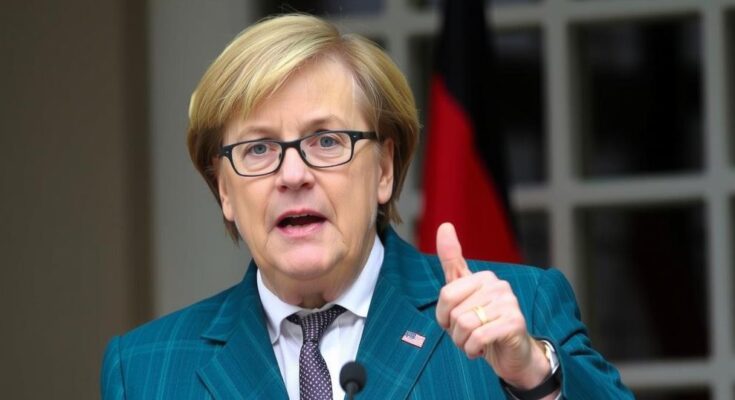German President Frank-Walter Steinmeier has dissolved parliament and scheduled a general election for February 23, 2024, following the collapse of Chancellor Olaf Scholz’s coalition. The coalition’s failure was caused by internal disputes about economic recovery strategies and heightened by a deadly car-ramming attack at a Christmas market, raising critical debates on security and immigration in Germany. The CDU/CSU party leads in polls, while the Social Democrats are trailing significantly.
On February 23, Germany will hold an early general election following the dissolution of parliament by President Frank-Walter Steinmeier. The decision to dissolve parliament came after Chancellor Olaf Scholz’s coalition government collapsed, primarily due to internal strife regarding strategies to revive the ailing economy. The government’s disintegration was further exacerbated by a tragic car-ramming attack at a Christmas market in Magdeburg, resulting in five fatalities and prompting urgent discussions on security and immigration in the nation.
In his announcement, President Steinmeier emphasized the imperative of establishing political stability and urged for a respectable campaign devoid of malice. The attack by Saudi national Taleb al-Abdulmohsen, who allegedly held “Islamophobic” views, has intensified scrutiny on immigration policies. The Conservative CDU/CSU party leads current polls with 32 percent, advocating for stricter immigration regulations and enforcing deportations for those with criminal backgrounds. In contrast, the far-right Alternative for Germany (AfD) garners approximately 19 percent, advocating for greater border controls and questioning the country’s immigration practices.
Steinmeier articulated the need for “fair and transparent means” in the upcoming election campaign while warning against the threats posed by foreign influences, especially via social media platforms. He denounced hatred and violence as unworthy of a democratic election. As Germany faces a myriad of challenges, including economic instability and security concerns amid ongoing international conflicts, it remains uncertain how the election outcome will shape the nation’s direction, especially regarding military support for Ukraine and environmental policies. Scholz’s Social Democrats are significantly trailing in the polls with only 15 percent support, following the coalition’s breakdown, which comes amidst critical transitions in German politics.
In light of various pressing issues, the next government will need to address repeatedly discussed topics such as immigration reform, defense expenditure, and economic rejuvenation through enhanced investments and infrastructure improvements. While the CDU proposes reassessing Germany’s nuclear energy policies and lessening restrictions on fossil fuel reliance, the SPD remains focused on advancing renewable energy initiatives. The forthcoming election and its implications will undeniably be pivotal in determining Germany’s future trajectory.
The dissolution of the German parliament and the call for early elections arise from significant political tensions, primarily stemming from the internal conflicts within Chancellor Olaf Scholz’s governing coalition. This coalition’s collapse followed a lack of consensus on how to address the nation’s economic challenges, which have intensified recently due to external crises. A tragic attack at a Christmas market has further ignited discussions around immigration and national security, critical issues that are set to play a pivotal role in the upcoming electoral discourse. Furthermore, the political landscape is compounded by varying party positions on defense and social policies, which will be crucial in shaping the future government’s agenda.
In conclusion, Germany stands on the brink of significant political reconfiguration as it prepares for an early election on February 23, marking a notable response to the government’s recent collapse and societal calls for heightened security amidst tragic events. The election will likely spotlight pivotal issues such as immigration, public safety, and economic stability. The varying party platforms suggest a momentous decision ahead for voters, who will wield substantial influence over the country’s direction in these turbulent times.
Original Source: www.benningtonbanner.com




